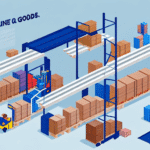Benefits of Shipping and Logistics Platforms
In today's fast-paced business environment, leveraging shipping and logistics platforms is essential for companies aiming to increase efficiency and enhance their competitive edge. These platforms provide a multitude of benefits that streamline operations, reduce costs, and elevate customer satisfaction.
Streamlining Business Operations
Shipping and logistics platforms simplify and automate the intricate processes involved in delivering products from warehouses to customers. Businesses can efficiently track inventory levels, manage orders, and monitor shipments in real-time. According to a McKinsey & Company report, companies that adopt these platforms can reduce logistics management time by up to 30%.
Additionally, these platforms offer valuable insights into the supply chain. By analyzing data on shipping times, delivery rates, and customer feedback, businesses can identify areas for improvement and optimize their logistics processes, leading to increased efficiency and cost savings.
Cost Savings
One of the primary advantages of utilizing shipping and logistics platforms is the potential for significant cost savings. Platforms optimize shipping routes, consolidate shipments, and reduce packaging materials, which collectively lower shipping and fulfillment expenses. Moreover, automation minimizes the need for manual labor and reduces the risk of errors, further cutting costs.
Real-time tracking and monitoring of shipments enable businesses to quickly identify and address any issues or delays, preventing additional costs associated with lost or damaged shipments. Advanced analytics and reporting tools help pinpoint areas for further optimization, ensuring continuous cost reduction.
Enhancing Customer Satisfaction
Modern consumers demand fast and reliable shipping, which can be challenging to achieve without specialized platforms. Shipping and logistics platforms enable businesses to offer faster delivery times, accurate order tracking, and improved communication with customers. This not only boosts customer satisfaction but also fosters loyalty and encourages repeat business.
By providing transparent shipping information and flexible delivery options, businesses can meet and exceed customer expectations, differentiating themselves from competitors and enhancing their reputation in the market.
Supply Chain Management
Shipping and logistics platforms play a pivotal role in supply chain management by offering comprehensive visibility into the entire supply chain. These platforms help businesses identify bottlenecks, optimize processes, and mitigate the risk of disruptions. Enhanced visibility leads to more efficient operations, faster delivery times, and superior customer service.
Furthermore, platforms contribute to sustainability efforts by providing data on the carbon footprint of different transportation options. This enables businesses to make environmentally responsible choices, which not only benefits the planet but also appeals to eco-conscious consumers.
Top Shipping and Logistics Platforms for Businesses
Choosing the right shipping and logistics platform is crucial for maximizing operational efficiency and cost-effectiveness. Below are some of the top platforms businesses should consider:
ShipBob
ShipBob offers a comprehensive suite of services tailored for e-commerce businesses. Their platform provides inventory management, order fulfillment, and real-time tracking, making it easier for businesses to scale and meet customer demands.
Amazon Fulfillment
Amazon Fulfillment leverages Amazon's extensive logistics network to provide reliable and fast shipping options. This platform is ideal for businesses looking to tap into Amazon's vast customer base and benefit from its logistical expertise.
FedEx Fulfillment
FedEx Fulfillment offers a range of shipping solutions, including warehousing, order management, and packaging services. Their platform is designed to help businesses streamline their fulfillment processes and ensure timely deliveries.
UPS WorldShip
UPS WorldShip provides diverse shipping options, including ground, air, and international shipping. It offers real-time tracking and reporting, and integrates seamlessly with popular e-commerce platforms like Shopify and WooCommerce.
DHL eCommerce
DHL eCommerce specializes in international shipping, offering express and economy options, customs clearance, and comprehensive tracking services. Their platform includes tools to optimize shipping processes and reduce costs.
Advanced Features and Integrations
Shipping and logistics platforms come equipped with a variety of advanced features and integrations that enhance their functionality and provide additional value to businesses.
Real-Time Tracking
Real-time tracking is essential for modern shipping operations. It allows businesses and customers to monitor the status of shipments in real-time, reducing the uncertainty associated with delivery times and enhancing transparency.
Real-time tracking helps businesses quickly identify and resolve any issues or delays, ensuring that shipments arrive on time and maintaining high levels of customer satisfaction.
Artificial Intelligence and Machine Learning
Artificial Intelligence (AI) and machine learning are revolutionizing the shipping and logistics industry. These technologies enable predictive analytics, demand forecasting, and automated decision-making, which enhance overall efficiency and reduce operational costs.
AI-powered systems can analyze vast amounts of data to optimize shipping routes, predict potential disruptions, and recommend the most cost-effective shipping options, thereby streamlining logistics processes.
Integration with Business Tools
Seamless integration with other business tools is a critical feature of effective shipping and logistics platforms. Integrating with e-commerce platforms, inventory management systems, and accounting software ensures a unified workflow and eliminates data silos.
For instance, integrating with inventory management software allows businesses to automatically update stock levels based on orders, preventing stockouts and overstocking. Similarly, integration with accounting software automates billing and invoicing, reducing the risk of errors and saving time.
Implementation Strategies and Best Practices
Successfully implementing a shipping and logistics platform requires careful planning and adherence to best practices. Below are strategies to ensure a smooth transition and maximize the benefits of the platform:
Overcoming Common Challenges
- Data Integration: Ensure that the platform can seamlessly integrate with existing systems to maintain data consistency and accuracy.
- Managing Multiple Carriers: Choose a platform that can handle multiple shipping carriers to provide flexibility and optimize shipping costs.
- Ongoing Maintenance and Support: Partner with a platform provider that offers comprehensive support and regular updates to address any issues promptly.
By proactively addressing these challenges, businesses can ensure a successful implementation and fully leverage the platform's capabilities.
Best Practices for Adoption
- Evaluate Different Platforms: Assess each platform's features, pricing, and compatibility with your business needs before making a decision.
- Involve Key Stakeholders: Engage team members from various departments to gather comprehensive insights and ensure the platform meets all business requirements.
- Provide Ongoing Training and Support: Ensure that all users are well-trained and have access to support resources to maximize platform efficiency.
- Monitor Performance and Make Adjustments: Regularly review platform performance and make necessary adjustments to optimize operations.
Adhering to these best practices will help businesses maximize the benefits of shipping and logistics platforms and achieve sustained growth.
Future Trends in Shipping and Logistics Platforms
The shipping and logistics industry is continually evolving, with several emerging trends shaping its future:
Integration of Artificial Intelligence and Machine Learning
AI and machine learning are becoming integral to logistics operations, enabling predictive analytics, demand forecasting, and automated decision-making. These technologies enhance efficiency by optimizing shipping routes, predicting potential disruptions, and recommending cost-effective shipping options.
Eco-Friendly Packaging and Sustainable Shipping Options
As businesses prioritize sustainability, there is a growing trend towards eco-friendly packaging and sustainable shipping options. Platforms are increasingly offering data on the environmental impact of different transportation methods, allowing businesses to make environmentally responsible choices that resonate with eco-conscious consumers.
Blockchain Technology
Blockchain technology is gaining traction in the shipping and logistics sector by enhancing transparency and security within the supply chain. Blockchain provides a tamper-proof record of all transactions and movements of goods, reducing the risk of fraud and errors and fostering greater trust among stakeholders.
Enhanced Customer Experience
With the rise of e-commerce, there is a heightened emphasis on customer experience in shipping and logistics. Customers expect not only fast and reliable shipping but also real-time tracking and personalized delivery options. To meet these expectations, businesses are investing in new technologies and strategies to improve the speed and efficiency of their logistics operations.
Case Studies: Success with Shipping and Logistics Platforms
Many companies have successfully leveraged shipping and logistics platforms to drive growth and enhance operational efficiency. Here are a couple of notable examples:
E-commerce Growth with Third-Party Logistics
A small e-commerce business adopted a third-party logistics provider, allowing them to focus on expanding their product line and marketing efforts. This strategic shift led to a 50% increase in sales within the first year, demonstrating the transformative impact of effective logistics management.
Improved Delivery Performance through Real-Time Tracking
Another company implemented real-time tracking to monitor their supply chain closely. This proactive approach enabled them to identify and address supply chain issues before they affected customers, resulting in a 30% reduction in delivery delays and a significant boost in customer satisfaction ratings.
These case studies highlight the pivotal role that shipping and logistics platforms play in driving business growth and enhancing operational efficiency.
Conclusion
Shipping and logistics platforms offer a comprehensive suite of benefits that can help businesses streamline their operations, reduce costs, and enhance customer satisfaction. By carefully evaluating different platforms, integrating them with other business tools, and adhering to best practices for implementation and management, businesses can fully capitalize on these platforms to drive growth in today's competitive marketplace. Embracing advanced technologies and staying abreast of industry trends will further ensure sustained success and operational excellence.






















